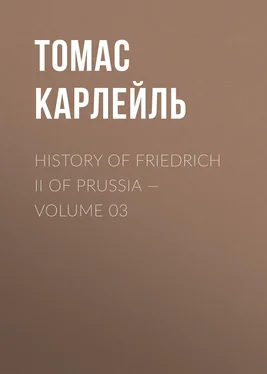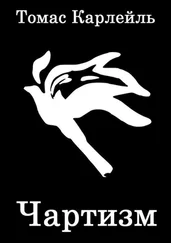Томас Карлейль - History of Friedrich II of Prussia — Volume 03
Здесь есть возможность читать онлайн «Томас Карлейль - History of Friedrich II of Prussia — Volume 03» — ознакомительный отрывок электронной книги совершенно бесплатно, а после прочтения отрывка купить полную версию. В некоторых случаях можно слушать аудио, скачать через торрент в формате fb2 и присутствует краткое содержание. Жанр: foreign_prose, История, literature_19, foreign_edu, foreign_antique, на английском языке. Описание произведения, (предисловие) а так же отзывы посетителей доступны на портале библиотеки ЛибКат.
- Название:History of Friedrich II of Prussia — Volume 03
- Автор:
- Жанр:
- Год:неизвестен
- ISBN:нет данных
- Рейтинг книги:5 / 5. Голосов: 1
-
Избранное:Добавить в избранное
- Отзывы:
-
Ваша оценка:
- 100
- 1
- 2
- 3
- 4
- 5
History of Friedrich II of Prussia — Volume 03: краткое содержание, описание и аннотация
Предлагаем к чтению аннотацию, описание, краткое содержание или предисловие (зависит от того, что написал сам автор книги «History of Friedrich II of Prussia — Volume 03»). Если вы не нашли необходимую информацию о книге — напишите в комментариях, мы постараемся отыскать её.
History of Friedrich II of Prussia — Volume 03 — читать онлайн ознакомительный отрывок
Ниже представлен текст книги, разбитый по страницам. Система сохранения места последней прочитанной страницы, позволяет с удобством читать онлайн бесплатно книгу «History of Friedrich II of Prussia — Volume 03», без необходимости каждый раз заново искать на чём Вы остановились. Поставьте закладку, и сможете в любой момент перейти на страницу, на которой закончили чтение.
Интервал:
Закладка:
Kurfurst Albert died in 1486, March 11, aged seventy-two. It was some months after Bosworth Fight, where our Crooked Richard got his quietus here in England and brought the Wars of the Roses to their finale:—a little chubby Boy, the son of poor parents at Eisleben in Saxony, Martin Luther the name of him, was looking into this abtruse Universe, with those strange eyes of his, in what rough woollen or linsey-woolsey short-clothes we do not know. [Born 10th November, 1483]
Albert's funeral was very grand; the Kaiser himself, and all the Magnates of the Diet and Reich attending him from Frankfurt to his last resting-place, many miles of road. For he died at the Diet, in Frankfurt-on-Mayn; having fallen ill there while busy,—perhaps too busy for that age, in the harsh spring weather,—electing Prince Maximilian ("lucky Max,") who will be Kaiser too before long, and is already deep in ILL-luck, tragical and other to be King of the Romans. The old Kaiser had "looked in on him at Onolzbach" (Anspach), and brought him along; such a man could not be wanting on such an occasion. A man who "perhaps did more for the German Empire than for the Electorate of Brandenburg," hint some. The Kaiser himself, Friedrich III., was now getting old; anxious to see Max secure, and to set his house in order. A somewhat anxious, creaky, close-fisted, ineffectual old Kaiser; [See Kohler ( Munzbelustigungen, vi. 393-401; ii. 89-96, &c.) for a vivid account of him.] distinguished by his luck in getting Max so provided for, and bringing the Seventeen Provinces of the Netherlands to his House. He is the first of the Hapsburg Kaisers who had what has since been called the "Austrian lip"—protrusive under-jaw, with heavy lip disinclined to shut. He got it from his Mother, and bequeathed it in a marked manner; his posterity to this day bearing traces of it. Mother's name was Cimburgis, a Polish Princess, "Duke of Masovia's daughter;" a lady who had something of the MAULTASCHE in her, in character as well as mouth.—In old Albert, the poor old Kaiser has lost his right hand; and no doubt muses sadly as he rides in the funeral procession.
Albert is buried at Heilsbronn in Frankenland, among his Ancestors,—burial in Brandenburg not yet common for these new Kurfursts:—his skull, in an after-time, used to be shown there, laid on the lid of the tomb; skull marvellous for strength, and for "having no visible sutures," says Rentsch. Pious Brandenburg Officiality at length put an end to that profanation, and restored the skull to its place,—marvellous enough, with what had once dwelt in it, whether it had sutures or not.
JOHANN THE CICERO IS FOURTH KURFURST, AND LEAVES TWO NOTABLE SONS
Albert's eldest Son, the Fourth Kurfurst, was Johannes Cicero (1486-1499): Johannes was his natural name, to which the epithet "Cicero of Germany (CICERO GERMANIAE)" was added by an admiring public. He had commonly administered the Electorate during his Father's absences; and done it with credit to himself. He was an active man, nowise deficient as a Governor; creditably severe on highway robbers, for one thing,—destroys you "fifteen baronial robber-towers" at a stroke; was also concerned in the Hungarian-Bohemian DONNYBROOK, and did that also well. But nothing struck a discerning public like the talent he had for speaking. Spoke "four hours at a stretch in Kaiser Max's Diets, in elegantly flowing Latin;" with a fair share of meaning, too;—and had bursts of parliamentary eloquence in him that were astonishing to hear. A tall, square-headed man, of erect, cheerfully composed aspect, head flung rather back if anything: his bursts of parliamentary eloquence, once glorious as the day, procured him the name "Johannes CICERO;" and that is what remains of them: for they are sunk now, irretrievable he and they, into the belly of eternal Night; the final resting-place, I do perceive, of much Ciceronian ware in this world. Apparently he had, like some of his Descendants, what would now be called "distinguished literary talents,"—insignificant to mankind and us. I find he was likewise called DER GROSSE, "John the GREAT;" but on investigation it proves to be mere "John the BIG," a name coming from his tall stature and ultimate fatness of body.
For the rest, he left his family well off, connected with high Potentates all around; and had increased his store, to a fair degree, in his time. Besides his eldest Son who followed as Elector, by name Joachim I., a burly gentleman of whom much is written in Books, he left a second Son, Archbishop of Magdeburg, who in time became Archbishop of Mainz and Cardinal of Holy Church, [Ulrich van Hutten's grand "Panegyric" upon this Albert on his first Entrance into Mainz (9th October, 1514),—"entrance with a retinue of 2,000 horse, mainly furnished by the Brandenburg and Culmbach kindred," say the old Books,—is in Ulrichi ab Hutten Equitis Germani Opera (Munch's edition; Berlin, 1821), i. 276-310.]—and by accident got to be forever memorable in Church-History, as we shall see anon. Archbishop of Mainz means withal KUR-MAINZ, Elector of Mainz; who is Chief of the Seven Electors, and as it were their President or "Speaker." Albert was the name of this one; his elder Brother, the then Kur-Brandenburg, was called Joachim. Cardinal Albert Kur-Mainz, like his brother Joachim Kur-Brandenburg, figures much, and blazes widely abroad, in the busy reign of Karl V., and the inextricable Lutheran-Papal, Turk-Christian business it had.
But the notable point in this Albert of Mainz was that of Leo X. and the Indulgences. [Pauli, v. 496-499; Rentsch, p. 869.] Pope Leo had permitted Albert to retain his Archbishopric of Magdeburg and other dignities along with that of Mainz; which was an unusual favor. But the Pope expected to be paid for it,—to have 30,000 ducats (15,000 pounds), almost a King's ransom at that time, for the "Pallium" to Mainz; PALLIUM, or little Bit of woollen Cloth, on sale by the Pope, without which Mainz could not be held. Albert, with all his dignities, was dreadfully short of money at the time. Chapter of Mainz could or would do little or nothing, having been drained lately; Magdeburg, Halberstadt, the like. Albert tried various shifts; tried a little stroke of trade in relics,—gathered in the Mainz district "some hundreds of fractional sacred bones, and three whole bodies," which he sent to Halle for pious purchase;—but nothing came of this branch. The 15,000 pounds remained unpaid; and Pope Leo, building St. Peter's, "furnishing a sister's toilet," and doing worse things, was in extreme need of it. What is to be done? "I could borrow the money from the Fuggers of Augsburg," said the Archbishop hesitatingly; "but then—?"—"I could help you to repay it." said his Holiness: "Could repay the half of it,—if only we had (but they always make such clamor about these things) an Indulgence published in Germany!"—"Well; it must be!" answered Albert at last, agreeing to take the clamor on himself, and to do the feat; being at his wits'-end for money. He draws out his Full-Power, which, as first Spiritual Kurfurst, he has the privilege to do; nominates (1516) one Tetzel for Chief Salesman, a Priest whose hardness of face, and shiftiness of head and hand, were known to him; and—here is one Hohenzollern that has a place in History! Poor man, it was by accident, and from extreme tightness for money. He was by no means a violent Churchman; he had himself inclinations towards Luther, even of a practical sort, as the thing went on. But there was no help for it.
Cardinal Albert, Kur-Mainz, shows himself a copious dexterous public speaker at the Diets and elsewhere in those times; a man intent on avoiding violent methods;—uncomfortably fat in his later years, to judge by the Portraits. Kur-Brandenburg, Kur-Mainz (the younger now officially even greater than the elder), these names are perpetually turning up in the German Histories of that Reformation-Period; absent on no great occasion; and they at length, from amid the meaningless bead-roll of Names, wearisomely met with in such Books, emerge into Persons for us as above.
Читать дальшеИнтервал:
Закладка:
Похожие книги на «History of Friedrich II of Prussia — Volume 03»
Представляем Вашему вниманию похожие книги на «History of Friedrich II of Prussia — Volume 03» списком для выбора. Мы отобрали схожую по названию и смыслу литературу в надежде предоставить читателям больше вариантов отыскать новые, интересные, ещё непрочитанные произведения.
Обсуждение, отзывы о книге «History of Friedrich II of Prussia — Volume 03» и просто собственные мнения читателей. Оставьте ваши комментарии, напишите, что Вы думаете о произведении, его смысле или главных героях. Укажите что конкретно понравилось, а что нет, и почему Вы так считаете.









